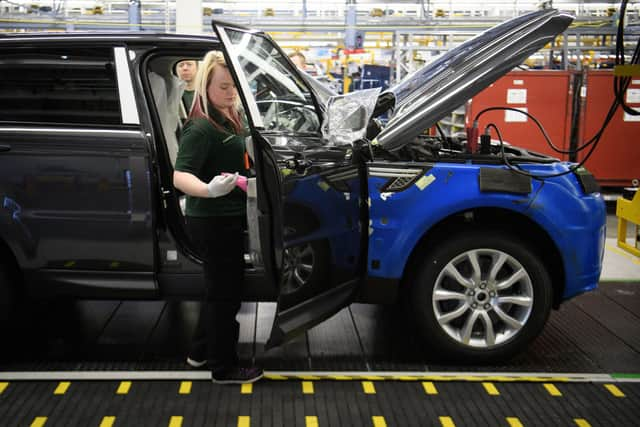EVs help new car market stabilise but experts warn of tough times as registrations slow
and live on Freeview channel 276
New car registrations rose for the first time in six months in August, bringing some stability to the troubled industry.
Registrations were up 1.2% in August compared with August 2021, with 68,858 new cars registered in what is a traditionally quiet pre-plate change month.
Advertisement
Hide AdAdvertisement
Hide AdThe small increase is a departure from the previous five months which saw year-on-year declines. However, the Society of Motor Manufacturers and Traders warned that last month’s performance was still the second weakest August since 2013. The only worst month was August 2021, when sales were down 22%.
The figures also revealed that for the year-to-date registrations were 10% down on 2021’s and showed a slowing in demand for electric vehicles.


Experts said that the uptick was a welcome indication that supply problems could be easing but warned that the current economic situation could see demand fall.
Mike Hawes, chief executive of the SMMT, said, “August’s new car market growth is welcome, but marginal during a low volume month. Spiralling energy costs and inflation on top of sustained supply chain challenges are piling even more pressure on the automotive industry’s post-pandemic recovery, and we urgently need the new Prime Minister to tackle these challenges and restore confidence and sustainable growth.
Advertisement
Hide AdAdvertisement
Hide Ad“With September traditionally a bumper time for new car uptake, the next month will be the true barometer of industry recovery as it accelerates the transition to zero emission mobility despite the myriad challenges.”
Slowing EV demand
The latest figures shows that despite a slowing in the number of new EV registrations, it was still battery-powered vehicles which fuelled August’s modest growth. Registrations of EVs were up 35% and petrol-powered cars up 7.5% while diesel’s decline continued - down 12% - and hybrids also fell, with plug-ins suffering a 23% decline.
However, the rate of growth in the EV market has fallen sharply, August’s figures represent a year-to-date increase of 48.8%, compared with the 102% recorded in March. Some observers believe this could be a sign of consumer concern around how rising energy costs will affect charging while others believe that demand for EVs will keep growth strong as production levels return to normal.
Ian Plummer, commercial director at Auto Trader, said: “The SMMT’s sales figures highlight just how much the industry’s ongoing supply challenges remain the key factor holding back the market. But energy price rises are beginning to bite ahead of October’s surge in the energy price cap, and our data is beginning to show early signs of a waning of appetite for electric vehicles as buyers weigh up higher charging costs against running a traditionally fuelled vehicle.
Advertisement
Hide AdAdvertisement
Hide Ad“Despite the looming rise in energy bills, electric vehicles are still much cheaper to run than petrol or diesel cars. That will still underpin demand for EVs in the longer term, despite the higher up-front costs, but there could well be some short-term impact on EV demand as the financial benefits of running EVs compared to petrol or diesel are narrowed.”
Chris Evans, head of sales at online marketplace Heycar also believes that EV interest will continue to grow despite rising running costs for many drivers: “If energy price trends continue, we estimate that EV fuel costs will reach parity with petrol and diesel within six months. However, while some car buyers will be put off by the higher running costs, we think the UK’s EV market will continue to grow as there is already a significant shortage of EV stock compared to demand. Soaring energy costs are unlikely to derail this trend in the short term.”
Industry on a precipice
Industry observers have also warned that the growing cost of living crisis could stunt any recovery in the new car market.
James Fairclough, CEO of AA Cars, said: “The improvement in sales comes amid further signs of recovery in the supply of new cars, with the number rolling off UK production lines rising for the third consecutive month.
Advertisement
Hide AdAdvertisement
Hide Ad“However, questions remain over whether buyer demand will rise to meet that increasing supply, as the cost-of-living crisis is steadily reducing disposable incomes and affecting people’s willingness to make big financial commitments.”
Jim Holder, editorial director at What Car?, said despite improvements in the supply chain, the UK car industry was “at the edge of a precipice” and motorists could face price rises.
He said: “It faces the short-term crisis of a potential recession eroding new car demand and undermining the buoyant used car market, plus the potentially longer-term impacts of rising energy and raw material costs, all at a time when it needs to be investing unprecedented amounts in new electric car technology.
“Previous estimates by the SMMT found the rise in energy prices will add another £90 million in costs for OEMs operating in the UK this year alone. A rise in costs of manufacturing is eventually passed to consumers through higher prices or offset with lower investment - neither which is ideal for the sector or the economy.”
Comment Guidelines
National World encourages reader discussion on our stories. User feedback, insights and back-and-forth exchanges add a rich layer of context to reporting. Please review our Community Guidelines before commenting.
